Double Transformation: Low-Code and Cloud Native to Supercharge Application Development
“Speeding up enterprise application development without worrying about the underlying infrastructure, how can that be done?”
With increasing demands from the digital workforce, many organizations are looking for new ways to reimagine and rearchitect their business processes to cope with constraints of the linear and rigid traditional application development methodology. Having said that, what kind of platforms and technologies can organizations leverage to resolve their business challenges and stay agile to react to changes?
According to Forrester Predictions 2021: Software Development, by the end of 2021, 75% of development shops will be using low-code platforms, up from 44% using or planning to adopt in 2020. To cope with limitations brought by the traditional application building approach, modernized application development is built for change to enable businesses to rapidly build scalable applications using a visual approach, and this is where low-code platforms like Joget come into view.
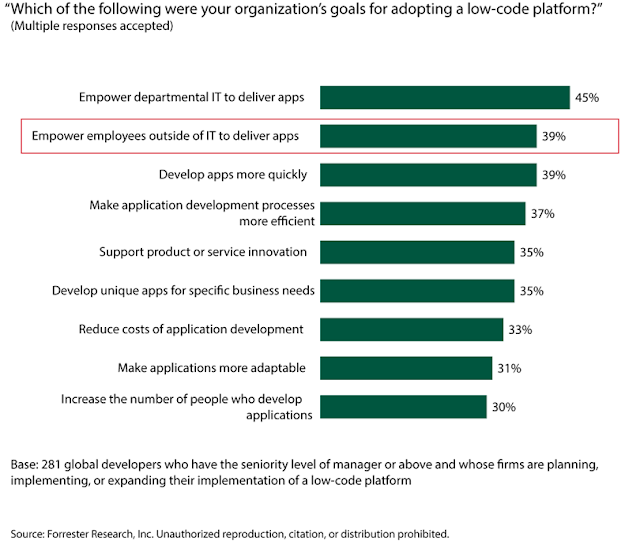 |
Source: Forrester Analytics Business Technographics® Developer Survey, 2021 |
The chart above from Forrester Analytics Business Technographics® Developer Survey, 2021 shows that 39% of organizations adopt a low-code platform to empower their employees outside of IT to deliver applications. By empowering anyone with or without coding knowledge from any industry, the Joget DX open source no-code/low-code platform fosters collaboration between business users without technical skills and professional IT developers without business expertise. The platform enables them to be innovative and to work hand-in-hand in their app development process, with higher flexibility to drive dramatic improvements with immense business value, in a shorter delivery time.
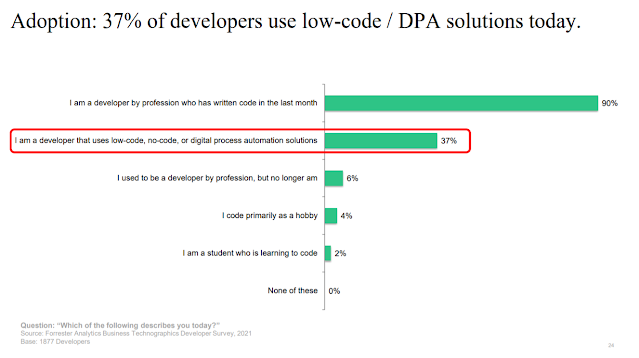 |
Source: Joget webinar featuring Lee Sustar, Principal Analyst at Forrester - Supercharge Application Development with Cloud Native Technologies and Low-Code Platforms |
In our recent webinar featuring guest speaker Lee Sustar, Principal Analyst at Forrester, statistics from the Forrester Analytics Business Technographics Developer Survey conducted in 2021 were shared. 37% of the developers surveyed are either using no-code, low-code or digital process automation solutions to resolve their business issues. With the increasing adoption of such platforms, it is apparent that this new way of building enterprise applications is now revamping the technology blueprint with its lower costs, faster turnaround times, thinner project management layer and extensive adaptability.
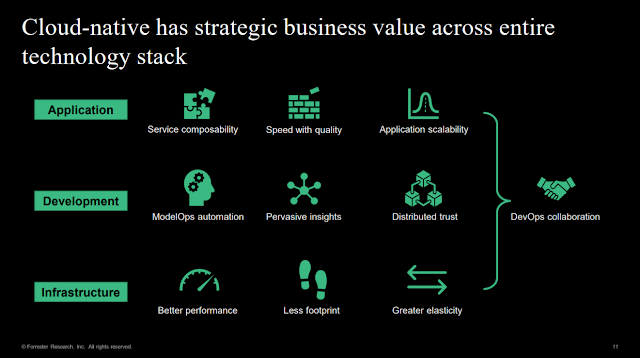 |
Source: Joget webinar featuring Lee Sustar, Principal Analyst at Forrester - Supercharge Application Development with Cloud Native Technologies and Low-Code Platforms |
Forrester predicts that within 2 years, the number of enterprises using containers for projects or apps should double. Along the line, much has been written about cloud native technologies like containers and container orchestration as the future of enterprise IT, with Kubernetes as the de facto standard.
With cloud native technologies, businesses can scale down the cost and time spent on operational processes and maximize their focus on application development and release with the abstraction of infrastructure layers. One example to illustrate this would be Red Hat OpenShift, the leading Kubernetes platform built for an open hybrid cloud strategy to fulfill the infrastructure layer while Red Hat Marketplace provides a simpler way to try, buy and manage certified enterprise software for cloud native environments with a broad range of commercial solutions being offered.
According to the findings shared by Lee Sustar during the webinar, there are 5 reasons why cloud native is emerging as a business requirement today:
- Application development needs (more!) automation
- B2C and B2B applications require scalability
- Software stability is increasingly important
- Multiple software deployment options are expected
- Technology innovation will further accelerate
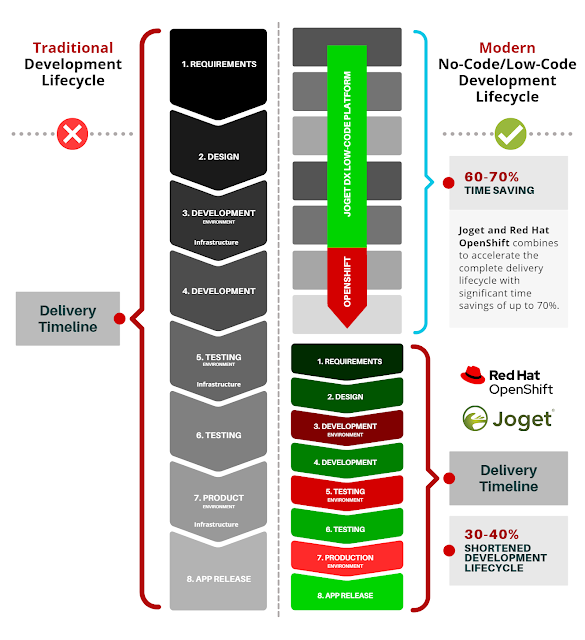 |
| Source: Joget Whitepaper - Why No-Code / Low-Code Running on OpenShift Makes Sense for Every Enterprise |
Moving forward to “double transformation” using low-code and cloud native technologies, we can see that both are paramount when it comes to modern application development and digital transformation. From no infrastructure to running a full-fledged application, Joget DX low-code platform and Red Hat OpenShift enable organizations to bolster their app development by supercharging and modernizing legacy applications in half the time or less at a lower total cost of ownership. This allows them to turn their app ideas into reality and achieve groundbreaking business outcomes.
Get Started:
Kick start your digital transformation journey with Joget on the Red Hat Marketplace to begin creating your own enterprise app or download ready-made apps and plugins from the Joget Marketplace.
Here are some enterprise apps available for download:
- DISINI™ Vehicle Inspection & Insurance App
- Task Management and Tracking App
- Travel Advisory Tracking App
- Employee Temperature Tracking App
- Queue Safely App
Other resources to help you get started:
- Get Started - On-premise, on-demand, public/private cloud, cloud native and more.
- Joget DX Video Tutorials - Quick overview and build your first app.
- Joget DX Knowledge Base - User and developer reference, samples and other documentation.
- Community Q&A - Ask questions, get answers, and help others.
- Language Translations - Translations for more than 20 languages.
- Joget Mindshare™ Series - Information sharing and educational content ranging from whitepapers, webinars, video tutorials, customer success stories and more.
- Joget Academy - Self-paced online learning and certification.
- Joget Marketplace - Download ready made apps, plugins, templates and more.
- Joget Events - Upcoming and past Joget events & webinars.
- Joget Press - Joget press releases.
- Joget Reviews - Joget reviews and customer testimonials.
Follow us for the latest news and updates:

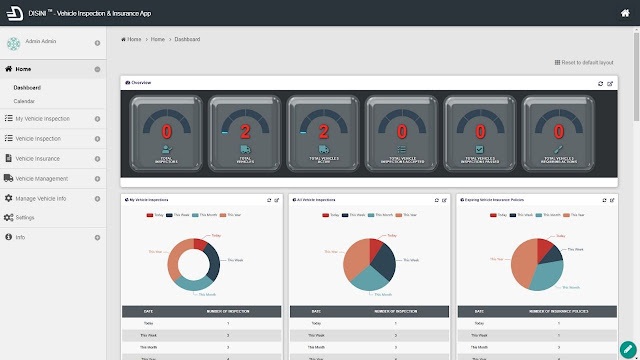

Comments
Post a Comment